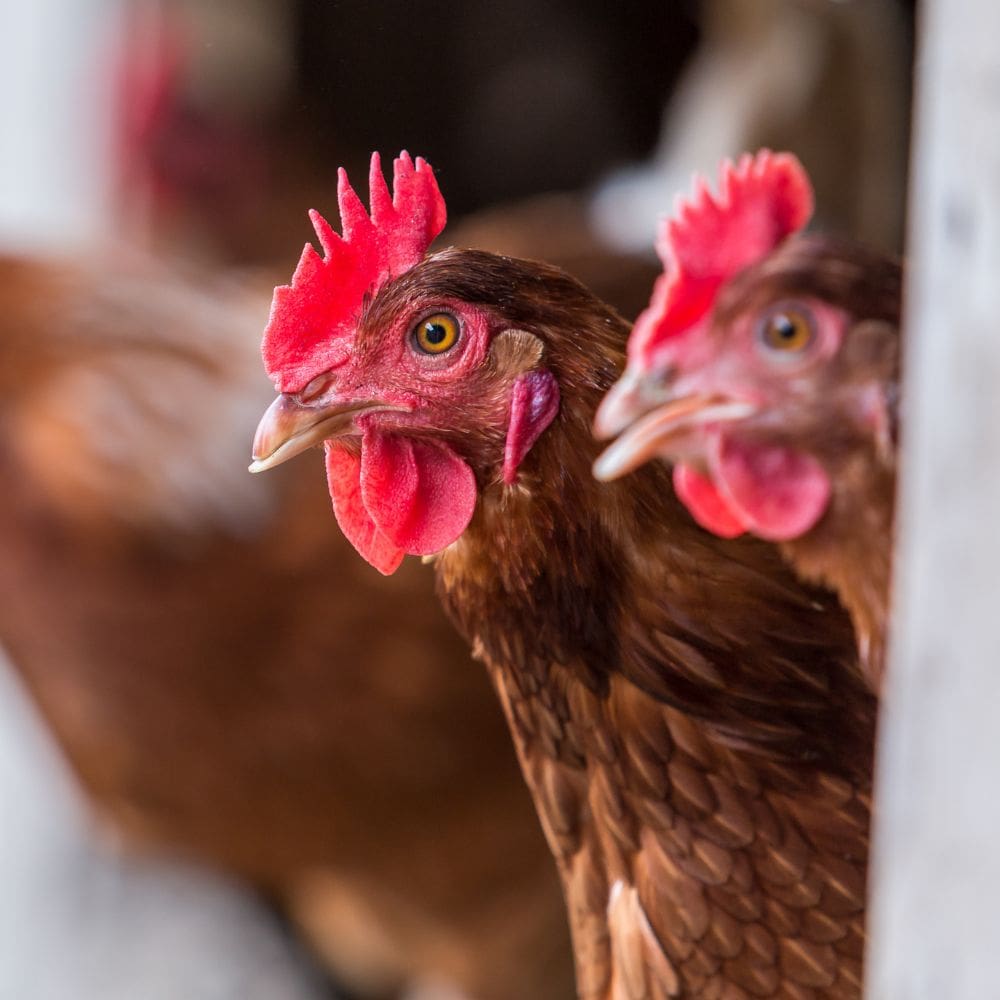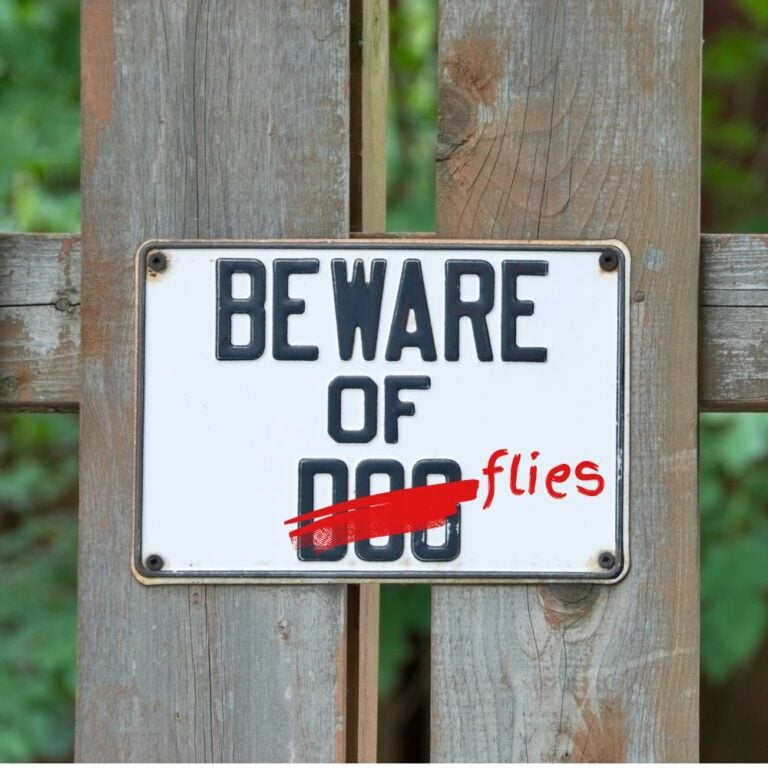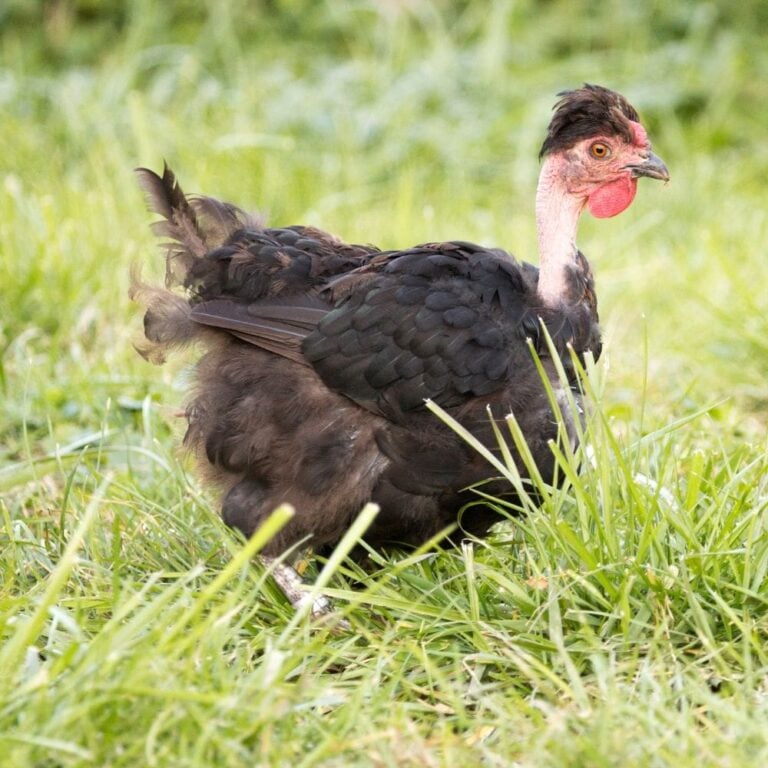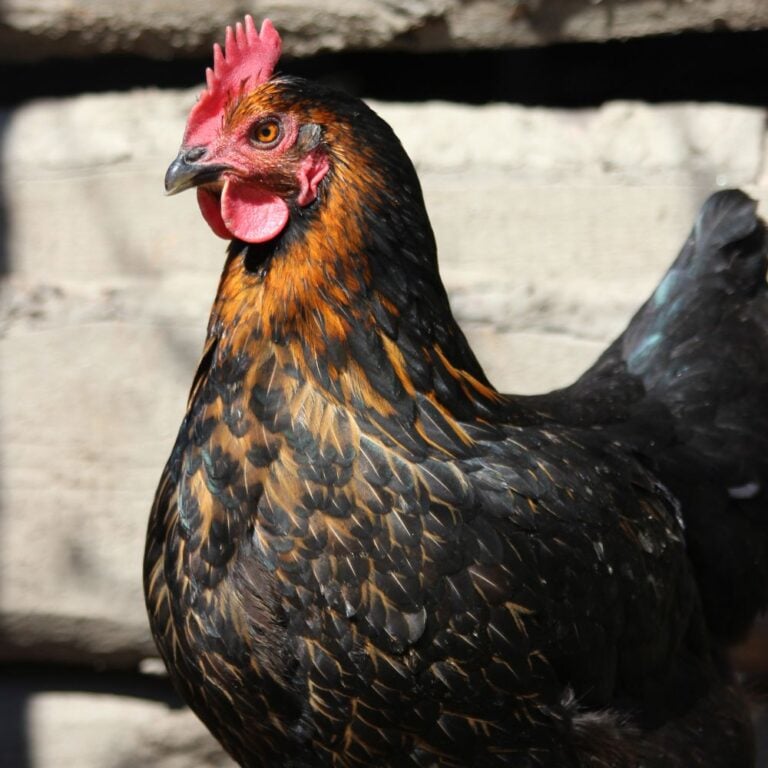Many beginners wonder “How much does it cost to own a chicken?” And in this article, we’re going to talk specifics about how chicken keeping can affect your wallet.
Like many things in life, you can make chicken keeping as expensive or inexpensive as you want.
Now, just how much does it cost to own a chicken? It is important to take into account the kinds of things you’ll spend money on and the ongoing costs that come with having a backyard full of fluffy butts.
Here’s your “chicken cost calculator” guide!

Table of Contents (Quickly Jump To Information)
How Much Does It Cost To Own A Chicken?
For 5 chickens:
- Regular feed typically costs about $30 per month, non-GMO feed about $150 per month
- A coop can cost from $1 to $2,000
- Bedding costs about $20 per month
- Feeders & waterers cost about $5 – $15 each
- Baby chicks cost about $5, adult chickens cost $1 to $30 on average
You can read more about the bedding I recommend here.
How Much Does It Cost To Buy A Chicken?
Buying a baby chicken can cost anything from a few cents to hundreds of dollars (for purebred breeding-quality, specialty chickens). On average, though baby chicks should cost less than $5 for most chicken breeds.
The specific cost depends on a variety of factors, such as the sex of the chicken (females usually cost more than males), how rare the breed is (rare breeds cost more), and if it is a hybrid chicken (like an Easter Egger).
Started pullets, which are young female chickens that are about 4 weeks old, cost on average $15 to $25 each. Laying hens can cost anywhere from $10 (for mixed breeds) to $100 (purebred from a hatchery). Certain breeds, like the all black chicken Ayam Cemani, can cost up to $5,000!
- Baby chicks: Starting at $1, averaging about $5
- Started pullets (4 weeks – 16 weeks): About $15 – $25
- Laying Hens: About $10 to $100, depending on breed
How Much Does A Pullet Cost?
It depends on the breed, but started pullets are on average around $15 to $25, although this amount varies by location. If you purchase one from a hatchery, you will also need to pay shipping (unless the shipping is embeded in the price). It’s typically best to buy a started pullet in your local area instead of online.
How Do You Get Chickens In Your Backyard?
To start raising chickens in your backyard, first make sure you can have chickens! Otherwise, you might have a nasty surprise visit from your city/town officials, and, heartbreakingly, you might have to re-home your flock. If you’re sure it’s okay to have chickens, you will need to make sure all their basic necessities such as the coop (or brooder, if they’re chicks), feed, water, etc are covered.
You can learn more about what backyard chickens need here. You can also find out where to buy baby chicks here.
If you want to hatch chicks from eggs (you can get eggs from a local dealer – just make sure the flock has a rooster). You’ll need an incubator as well. You can read about the best incubators I recommend here, and my favorite incubator here.
Where Can I Buy Egg Laying Chickens?
You can buy egg laying chickens at a hatchery, your local farm store (like Tractor Supply, Orschelns, Southern States, or Rural King, depending on your region), or from a local breeder.
To find a local breeder, it’s best to ask at farm stores in your area, or look on Facebook for groups. If you want a specific breed, you can search Facebook for breeder groups. If you plan to use a hatchery, choose one near you – the chicks will be shipped overnight or 2 day priority. A hatchery close to you means the chicks will have less time in transit.
Here’s a list of recommended hatcheries that will ship chicks to you:
- Cackle Hatchery (this is the hatchery I personally use, here’s a review)
- Murray McMurray
- Meyer Hatchery
- Ideal Poultry
- My Pet Chicken
- Stromberg’s
- Freedom Ranger Hatchery
When purchasing chicks from a local farm store or breeder, be sure to note the welfare of the chicks – if they don’t look healthy, or their crates don’t look clean, DO NOT BUY!!
Feeding Chickens
How much does it cost to feed a chicken per month?
On average, it costs $0.15 to feed your chickens per day, with organic feed costing at around $0.60 per pound. For a flock of 5 chickens, you will likely spend less than $30 a month, if you feed a 16% layer feed found at local farm stores.
For organic feed, you will spend more – about $150 per month. If you feed treats like black soldier fly larvae or mixed treats like BEE A Beautiful Hen (which is really popular), you need to factor those costs in as well.
However, it doesn’t pay to be cheap – chickens are living creatures, and you will need to feed them well so they lay healthy eggs for you. I have a list of what chickens can eat here.
The old saying “You are what you eat” is applicable to chickens as well. What you put in makes a difference in their health, the nutritional value of their eggs, and their lifespan.
How much should I feed a chicken?
The amount to feed a chicken varies, however, on average, 1 chicken needs about ½ – 1 cup of feed daily. You can free feed your chickens (you can use one of the chicken feeders I recommend here) or put a meal out for them daily.
Check their weight and general health frequently, and increase their feed if they need it. If you see them wasting a lot of feed, then decrease the amount you’re putting out for them (or use a no-waste chicken feeder).
Do chickens need herbal supplements?
While not strictly necessary, you can offer your flock herbal supplements (such as nesting herbs, or mixing herbs in their feed) to ensure that they will be at their optimum health – and a healthy immune system will protect them against common diseases. Remember that treating unhealthy chickens can impact your wallet and result in a lost flock member.
How much does a free range chicken cost?
If you plan to free range your chickens, you can save some money on their feed. However, it’s still advisable to feed them a 16% layer feed. For a flock of 5 chickens, you will likely spend less than $30 a month, if you feed a 16% layer feed found at local farm stores.
If you want to feed your hens non-GMO feed, it typically costs about $150 per month. Also, if you feed treats like black soldier fly larvae or mixed treats like PowerHen, you need to factor those costs in as well.
If you want your chickens to lay eggs for you, then you’ll need to feed them well. Free range chickens might not get all the nutrients they need, or they might eat stuff that effects the nutritional value of their eggs.
Buying Eggs vs. Keeping Chickens
Is it cheaper to have chickens or buy eggs?
If you simply want to save money, it’s cheapest to buy your eggs from a grocery store or allow your own flock to free range permanently. However, there’s other issues with both of those options.
For starters, the industrial egg industry, being concerned with profits, typically does not provide their chickens with healthy, happy lives. Unfortunatley, there have been multiple animal welfare issues reported over the years. Many of these chickens are killed or otherwise disposed of after 12 – 18 months. They’re usually confined to cages or very crowded living conditions. In some cases, they’re given antibiotics continuously, which does show up in their eggs.
The quality of the eggs is poor. If you’re conscious of your food sources, or an animal lover, consider raising chickens yourself or getting your eggs from a local supplier, where you can be sure the animals are treated with respect.
Chickens that free range permanently tend to have happier lives than chickens that are kept by the egg industry. However, they tend to hide their eggs (which defeats the purpose of raising them for eggs), or stop laying eggs altogether. They might also become flighty, since they have to fend for themselves against chicken predators.
Another option is to allow your chickens to feed off your compost pile, develop a mealworm breeding farm, or raise black soldier fly larvae (which can also feed off your compost pile). During spring, summer, and fall months, you can provide some type of free feed to your hens (through your compost pile) but the nutritional value of your eggs isn’t guaranteed, nor is the health of your flock.
Remember that once you have an established flock, keeping chickens is a relatively low cost because unlike other pets you can greatly profit from them since they produce food for you.
How many eggs does a chicken lay a day?
Chickens lay only one egg per day (unless they’ve laid an egg inside an egg – then technically, they’ve laid two. You can read more about abnormal eggs here.) Remember that there will be some days where they won’t lay eggs at all since a hen’s body take 24 – 26 hours to fully form one egg.
Chicken Coop Costs
How much does a chicken coop cost?
The chicken coop cost is typically around $200 to $2000 if you buy them from Amazon or another store. You can build your own chicken coop for around $100 or less (for a very simple structure). Although, if you can find pallets, you can build it for the cost of nails.
I’ve compiled 55+ free chicken coop plans here and a list of free pallet barn plans here. You can also find a list of what your coop should include here. You can find reviews of different chicken wire options here.
Is it cheaper to buy a coop or build one?
It depends primarily on the materials you use and the features your coop will have. Many low cost coops (around $200 – $300) are very cheap and will break after 1 or 2 years, regardless of what the manufacturer promises. In the long run, it’s cheaper to invest in a good coop or garden shed (that can be converted into a coop) or to build a coop yourself with good quality materials.
Remember that if you purchase a garden shed and convert it into a coop, you can always convert it back into a garden shed if you decide chickens aren’t for you – so this makes buying a good quality building worth the investment and it might increase your property value.
Keeping Chickens For Beginners
What are the best chickens for beginners?
Here’s a list of champion egg laying chicken breeds:
- Cochins
- Delaware
- Easter Eggers
- Jersey Giants
- Marans
- Rhode Island Reds
You can also read about more chicken breeds here.
Cochins
Cochins are a lot of fun to own because they’re hardy, lay brown eggs consistently, and enjoy human company. You can get a full-sized cochin or the bantam variety – and both have feathered feet! The bantams will eat less but will also lay smaller eggs. You can read about cochin chickens here.
Delaware
Delawares are excellent laying chickens that can produce up to 5 brown eggs per week. They’re cold hardy, distinctive looking, and friendly.
For those for whom patriotism is important, the Delaware Chicken is distinctly American. Bred and raised in the USA, it never gained the traction needed to find itself imported to other countries. To this day, it can only be found in the USA. That in itself makes this breed special.
Easter Eggers
Great for beginners because they lay consistently of about 250 eggs per year – and you might even get blue eggs! (Or green, or pink…..it just depends on the genetics of the individual hen.) You can read more about Easter Eggers here and other blue egg laying breeds here. If you definitely want blue eggs, you can learn about Ameraucanas here and Araucanas here.
Jersey Giants
These big birds are a heritage chicken breed, and also one of the largest purebred chickens in the United States.
Jerseys Giants are best as an addition to homes looking for an excellent show breed, some amazing broilers, or hens that lay between 150 and 200 brown eggs per year. This breed is quite popular and has a definite group of followers, in essence, it has its own fan club!
Marans
Marans are pretty quiet, disease-resistant, and are cold-hardy chickens that don’t require a lot of work. The hens lay chocolate-colored eggs (although how dark they are will depend on the individual chicken). They’re great layers producing approximately 250 per year.
Rhode Island Reds
Rhode Island Reds are another heritage chicken breed that’s pretty popular. They require little care. They pretty much just need food, water, a clean coop, and maybe vet care.
Your Rhode Island Reds won’t start laying eggs right away – you will have to wait a few months for that. But once they do, you can look forward to around four or five large brown eggs each week.
Is it hard to raise chickens for eggs?
No, but like any other pet, you need to ensure they’re safe, have access to food and water, and a clean home. They’re easier than dogs or cats because they can feed and water themselves (as long as you use a gravity feeder or a DIY chicken waterer that allows them to free-feed). And unlike dogs or cats, they don’t need to be let in and out of the house constantly.
It you’re concerned about the work, it’s best to start with 3 hens, and a small coop. You can always expand and build a bigger coop later. Chickens will produce eggs if they feel they are protected and are in a healthy and spacious environment. As long as you provide this, they should prove no trouble to raise for eggs.
Selling Chickens & Eggs for Profit
How much is a live chicken worth?
A live chicken will on average cost around $3 to $30 depending on the breed and age of the chicken. Here’s some general guidelines:
- Baby chicks: Starting at $1, averaging about $5
- Started pullets (4 weeks – 16 weeks): About $15 – $25
- Laying Hens: About $10 to $100, depending on breed
How much is a full grown chicken worth?
A full grown chicken can cost at around $1 to $5,000 depending on the breed and sex of the bird. Barnyard mixes (chickens of unknown lineage) can cost $1 while prized breeds like Ayam Cemani can cost $5,000. Age is also a factor: hens that come from the egg laying industry might be 12 months old, but cost $1. Older hens might be less (or even free), while chicks that are 6 months old (so, just starting to lay eggs) might cost more because they have a lot of egg laying year left.
So, best to do your research first in locking down your ideal bird, then calculate how much does it cost to own a chicken for your area.
Can I make money from eggs?
Possibly. This will depend on a variety of factors, including how much it costs to raise your chickens, what your chickens eat, and how much people will pay for eggs in your area. If you only sell a dozen eggs for $1, then it’s harder to turn a profit. But if you sell your eggs for $6 a dozen, then you’ll make money, as long as your chickens cost less than $6 to feed.
It’s best to write a detailed spreadsheet of expenses, then base your cost per dozen eggs off that.
How much are baby chicks worth?
The average baby chick sells for $5, depending on the breed. Purebred and unusual breeds will sell for more (maybe $7 – $10), while mixed breeds will sell for $1 or $2. Chicks over 1 week typically sell for less, also (since farm stores don’t want to keep them longer than 1 – 2 weeks).
If you’re planning to hatch eggs yourself, then you will want to sell the chicks “straight run,” and tell buyers you aren’t sure whether the chicks are hens or roosters. You’ll need to decide whether you’ll sell purebred or a hybrid chicken. Cost of a baby chick varies based on these factors.
Can I sell chicken feathers?
Yes, you can sell chicken feathers – there are even special birds bred for their feathers. Many chicken owners sell feathers on Ebay or Etsy. Feathers are usually sold by the pound.
Summary
Well, there you have it. I know there are a lot of variables and conditions – but such is life. You should, however, have enough information to decide now. I will speak beyond the cost for a monent. Don’t forget to factor in chicken happiness vibes. It’s a thing. Chickens bring a lot of joy…not to mention a lot of eggs that you can trust the nutrition of.
Maat van Uitert is a backyard chicken and sustainable living expert. She is also the author of Chickens: Naturally Raising A Sustainable Flock, which was a best seller in it’s Amazon category. Maat has been featured on NBC, CBS, AOL Finance, Community Chickens, the Huffington Post, Chickens magazine, Backyard Poultry, and Countryside Magazine. She lives on her farm in Southeast Missouri with her husband, two children, and about a million chickens and ducks. You can follow Maat on Facebook here and Instagram here.






![The Best Herbs For Chickens To Eat? These Are Them (Plus One For First Aid!) [Podcast]](https://thefrugalchicken.com/wp-content/uploads/2016/01/herbs-for-chickens.png)